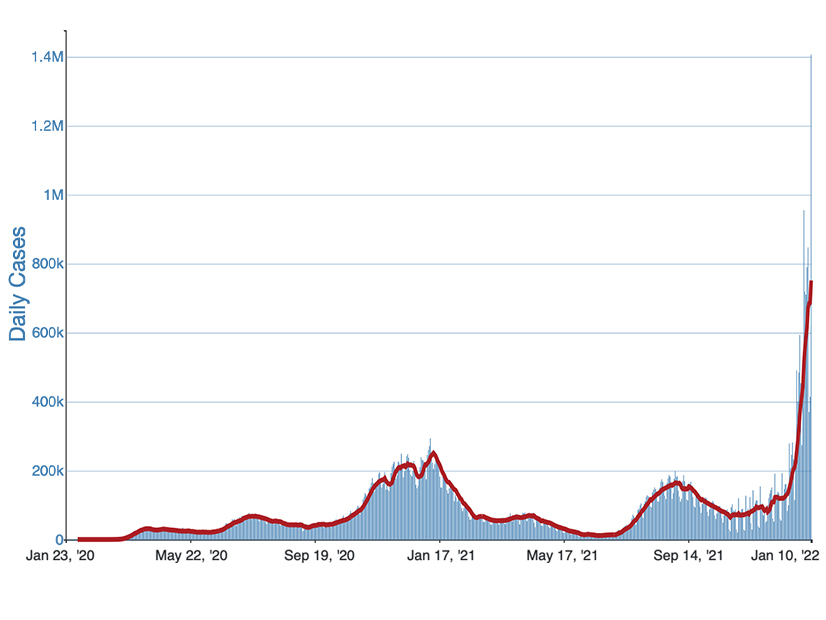
Citing “continued concerns about traveling and the growth of the Omicron” variant of COVID-19, NERC Board of Trustees Chair Ken DeFontes confirmed Wednesday that February’s meetings of the board and Member Representatives Committee (MRC) will be held virtually, rather than partially in person as originally planned.
Speaking at the MRC’s informational webinar this week — intended to preview the agenda and topics of discussion for next month’s meetings — DeFontes acknowledged that the news would bring “significant disappointment” and leave attendees “frustrated.” But in light of the recent return to rapid spread of the coronavirus, the chair said the decision to keep the meetings online-only was “the prudent thing to do.”
The number of daily cases of COVID-19 reported to the Centers for Disease Control and Prevention has spiked in recent months beyond any previous high points in the ongoing pandemic. More than 1.4 million cases were reported on Monday, the highest single-day figure since the novel coronavirus was first reported in the U.S. nearly two years ago. As of the same day, the seven-day moving average stood at more than 750,000 cases, with a total death count of more than 837,000.
A major driver of the recent explosive growth is the Omicron variant, first identified in November 2021 and “exponentially increasing in multiple countries,” according to the CDC. Omicron possesses both “increased transmissibility and the ability to evade immunity conferred by past infection or vaccination,” the agency said last month, meaning that even those who are protected against the original coronavirus or the Delta variant that emerged last year are still vulnerable to the new strain.
“Concerns about lower vaccine efficacy because of new variants have changed our understanding of the COVID-19 endgame, disabusing the world of the notion that global vaccination is by itself adequate for controlling SARS-CoV-2 infection,” according to a study published last month in The Lancet.
The study emphasized that while there is some evidence that the effects of Omicron may be less severe to individuals than previous variants — particularly for fully vaccinated people who have received booster shots — the speed of transmission means that “existing public health prevention measures” such as masking, social distancing and avoiding enclosed indoor spaces will be necessary to control the spread of the virus and prevent the health care system from becoming overloaded.
No Word on Rest of 2022
NERC’s board and MRC have not met in person since Feb. 6, 2020, when they gathered in Manhattan Beach, Calif. (See NERC Board of Trustees Briefs: Feb. 6, 2020.) The organization curtailed all of its in-person gatherings, including technical committee and standard drafting team meetings, the following month, after many participating bodies enacted travel restrictions in light of the pandemic.
February’s meetings were to have been the first step of relaxing these constraints: At the November 2021 meeting, DeFontes said the plan was for the board and MRC to gather in person at NERC’s Atlanta office while all other attendees joined virtually. (See “Hybrid Meetings to Start in February,” NERC Board of Trustees/MRC Briefs: Nov. 4, 2021.) The May and August meetings were tentatively planned to be held in-person in D.C. and Vancouver, Canada, respectively, while the November 2022 meeting would have likely been another hybrid gathering.
At November’s meeting, DeFontes emphasized that these plans had not been finalized. While he did not elaborate on the remaining meetings for 2022 in Wednesday’s call, it is probable that they will have to be revised as well.



